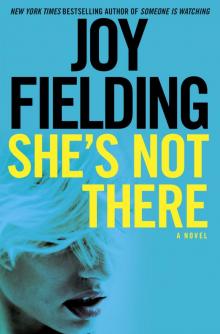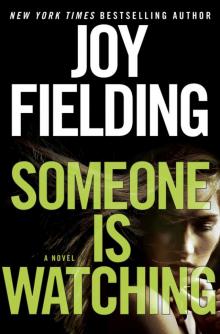- Home
- Joy Fielding
Puppet Page 31
Puppet Read online
Page 31
She smiles. “I’m fine, Ben. Or I will be once I get something to eat.”
“Okay. Why don’t we go grab some dinner? Try to figure out our next move.”
“You think we have any?”
He shrugs, his cell phone ringing inside his jacket.
“They share a past,” Amanda repeats wondrously as he answers it. “I guess that’s as good a motive for murder as any.”
“Hi,” Ben says into the phone, angling his body slightly away from her, so that she knows it’s Jennifer on the other end even before she hears echoes of the other woman’s voice. “What? When was this?”
“What is it?” Amanda asks, alarmed by the change in his voice.
“Is she all right?”
“Is who all right?”
“Okay.… Yeah. Thanks. I appreciate it.… Of course. I’ll call you later.”
“What was that about?” Amanda asks as Ben returns the phone to the inside pocket of his leather jacket.
“Your mother tried to kill herself,” he says quietly, without further adornment.
“What? How?”
“Apparently she swallowed a bunch of pills.”
“Pills? Where would she get pills?”
“I don’t know. They’ve taken her to Etobicoke General.”
“Can we see her?”
The elevator doors open and Ben leads Amanda through the lobby. “We can try.”
THIRTY
BY now the drive to the west end of the city is getting so familiar, Amanda thinks she could do it in her sleep, although she doubts she’ll ever sleep again. Her head feels like a glass jar full of old coins—cumbersome and heavy, in danger of cracking, of dubious value. Thoughts, like pennies, rattle through her brain, roll across her line of vision: her mother is crazy/her mother is dying; her mother shot a total stranger/she shot her ex-husband; Hayley Mallins is the proverbial girl next door/the girl next door has been lying to everyone since day one.
So what makes Amanda think she’s telling the truth now?
Amanda keeps her eyes peeled out the window, staring through the darkness, and concentrating all her energy on the host of new condominiums sprouting up like mushrooms along the lakeshore. So much has happened to the city in the last eight years, she thinks, in a concerted effort not to think anything else. If she lets her guard down, allows anything other than the dark sky, the bright lights, the traffic, the seemingly endless construction, into her thoughts for even one minute, her head will surely implode.
Her mother swallowed a bunch of pills. Why? Where did she get them? What made her do it?
“Lots of new buildings,” she says, her voice unnaturally loud, as if trying to scare away unwanted musings.
“The city just keeps growing,” Ben says in the same booming tones, as if his head is similarly afflicted.
Do you think my mother will be all right? “Do you think all this growth is a good thing?” Do you think there’s a chance my mother might die?
“I guess you can’t stop progress,” Ben says.
It was the babysitter, and not her mother, who dangled her like a puppet from her arms.
“I was never a big fan of suburbs,” Amanda says.
“Which is funny, don’t you think?” Ben says, half-statement, half-question.
Did her mother even know that her former husband had run off with the babysitter? Would she have cared?
“What’s funny?”
“Well, isn’t Florida pretty much one suburb after another?”
Amanda pictures the southeastern coast of the aptly named Sunshine State, sees one small oceanside community melding effortlessly into the next: Hobe Sound, Jupiter, Juno Beach, Palm Beach Gardens, Palm Beach proper, Hypoluxo, Manalapan, Delray … “I guess.”
Puppet, puppet. Who’s my little puppet?
Not her mother.
The babysitter.
Amanda grabs her head, presses the sides of her temples. Talk about false memories.
“Headache?”
“A doozy.”
“You have anything for it in your purse?”
Amanda shakes her head. A mistake. It shakes back.
“Maybe they can give you something for it at the hospital.”
“Maybe I could borrow something from my mother.” Amanda covers her eyes with her hands. “God, I don’t believe I said that.”
“She’ll be all right, Amanda.”
“I know,” Amanda agrees. Her mother is a force of nature. It will take more than a handful of pills to finish her off. “Did your girlfriend say what kind of pills my mother took?”
“I don’t think she knew.”
“Did she know where she got them?”
“Apparently she stole them from one of her cellmates.”
“The druggie who likes to clean, no doubt.”
“That would be my guess.”
“Any guesses as to why she’d do such a stupid thing?” Amanda realizes she is both angry and scared. Scared that her mother might die, and angry at herself for being scared. So what if her mother succeeds in killing herself? The truth is she’s been dead to Amanda for years. “Do you think she did it because of our visit? Because she realized how close we were to finding out the truth?”
“This isn’t your fault, Amanda. Don’t start blaming yourself.”
“I’m not blaming myself,” Amanda snaps, exchanging her anger at herself for anger at her former husband, finding it a far more comfortable fit. “Let’s get one thing straight here, shall we? Whatever my mother does is entirely up to her. If she wants to kill herself, that’s fine with me. Please don’t labor under the mistaken impression that I actually give a shit.”
“Don’t you?”
“I couldn’t care less that my mother tried to kill herself. I’d just like to know why. And I don’t need or appreciate the cheap psychoanalyzing. I am not blaming myself for anything. You’re a lawyer, not a therapist. You’re certainly not my husband anymore.”
“You’re absolutely right,” he tells her after a pause, refusing to take the bait, to give her the fight she craves. The tight clenching of his jaw is the only sign she might have gone too far.
“Dammit, can’t you make this thing go any faster?”
“I’m already going twenty kilometers over the limit.”
“Try twenty-five.”
“This is fast enough.”
“Look, if she’s really on her deathbed and we can get there before she croaks, maybe we can convince her to tell us the truth.”
Ben glances at her sideways. “Those are pretty tough words.”
“Yeah, well, I’m a pretty tough girl.”
“I don’t think that’s true.”
“Then you have a pretty short memory.”
Ben nods knowingly, grips tightly on the wheel. “Hang on.”
Ten minutes later, they pull into the parking lot of Etobicoke General. Amanda follows Ben through the front doors of the hospital into the main lobby and toward the information desk on the left. She tries not to take in too much of her surroundings, never having felt too comfortable around hospitals, and concentrating her focus on the wet footprints of the other visitors that run along the floor. Even still, she can’t help but notice the gift shop, the pharmacy, the mini food court. As if she’s stumbled into a mall and not a hospital. Only the smell gives it away, she thinks, trying to ignore the potent mix of rubbing alcohol and flowers, of blood and perfume, of disinfectant and medication. Of disease. Fear. Loss of control.
The fleeting aroma of one’s own mortality.
“Fourth floor,” Ben tells her, walking briskly toward the elevators, not bothering to take her elbow or slow down for her to catch up.
He’s hurt, she realizes. Although he’d never admit it. She’s opened up old wounds, ripped the bandage off a scar that was only just starting to heal. There he was, trying to be sympathetic and understanding and there for her, and her immediate reaction was to get away from him as fast as possible. To be anywhere but there.
Just as she did eight years ago when she walked out on their marriage. This isn’t working, she’d told him one night. They were lying in bed, having just finished making love.
What isn’t?
This whole marriage thing.
What are you talking about?
I want out.
I don’t understand. Did I do something wrong?
No.
Then why? Can we at least talk about it?
Nothing to talk about. It’s over. I want out.
That was it. He didn’t argue. He didn’t fight to make her stay. He did what he’d always done—he took her at her word. And so, with a few simple sentences, her marriage to Ben was over and done, over and out. She’d stuck to pretty much the same script when she’d ended her marriage to Sean. This isn’t working, she’d said as they were getting ready to go out for dinner with friends. Hell, might as well stick with what you know.
And so it goes, Amanda thinks, watching Ben disappear around a corner, wondering when his feelings became her responsibility. She has no time to cater to bruised male egos, no interest in making nice or playing fair. Besides, Ben’s the one who volunteered for this mess. It wasn’t her idea. She never told him to get involved. Just because they “shared a past” doesn’t mean she owes him anything. And just because she snapped at him in the car doesn’t give him the right to try to make her feel guilty now. She has absolutely nothing to feel guilty about. Not his hurt feelings. Not her mother’s pathetic attempt at suicide. None of it is her fault. She isn’t to blame for any of this.
Isn’t that exactly what he said?
This isn’t your fault, Amanda. Don’t start blaming yourself.
Goddammit, did he always have to be so right?
“I’m sorry,” she apologizes, joining him at the bank of elevators. “I was a bitch.”
He shrugs, says nothing. But when the elevator arrives, she feels the gentle, reassuring pressure of his hand on her elbow as he ushers her inside. The elevator quickly fills with people of various shapes and hues. Gloved hands reach across her as if she doesn’t exist to press the buttons on the side panel. Not one floor is missed, Amanda notes, her body pushed against Ben’s as the occupants of the elevator juggle for position. She folds in against his side, his arm reaching protectively around her shoulders as she inhales the strangely comforting damp leather of his jacket.
They exit the elevator at the fourth floor and follow the corridor around to the nurses’ station. “Room 426?” Ben asks the small gathering of nurses chatting behind a tall counter lined with recently delivered floral arrangements.
The nurses turn toward them in one graceful swoop. One of the nurses, a middle-aged woman with shiny brown skin and black, curly hair, extricates herself from the group. “You’re looking for Gwen Price?”
“Is she all right?” Amanda asks, holding her breath.
“You family?”
“I’m her daughter.”
The nurse glances at Ben. “You?”
“Her lawyer.”
“Other side, turn left, last room on the right.”
Amanda shoots from Ben’s side, vaults to the other side of the nurses’ station.
“I’m not sure they’re allowing visitors,” the nurse calls after them.
They spot the guard sitting outside her door as soon as they turn the corner. He has light brown skin and short-cropped hair. Not too tall, Amanda notes as he pushes himself off his chair, but muscular beneath his neat blue police uniform, and the eyes in his handsome face are dark and wary. His expression is a warning. It says, Come closer only if you dare. “Something I can do for you folks?” he asks in a voice that says they better not be wasting his time.
“I’m Ben Myers, Gwen Price’s attorney,” Ben tells him, proffering his identification. “This is Amanda Travis, her daughter. We’d like to see Mrs. Price.”
Amanda hands the officer her driver’s license, glancing toward the closed door of her mother’s hospital room as the policeman takes a moment to examine it. Her mother is inside that room, she thinks. Lying in bed. Possibly dying.
Why?
“Excuse me a minute,” the officer says, walking a few steps away from them and talking into his cell phone discreetly.
Why would her mother want to kill herself? Why would she rather die than tell the truth?
Amanda rocks back and forth on her heels. Because she’s my mother, that’s why. When has she ever done anything that makes sense?
“All right,” the police officer says, returning his phone to the holder on his belt. “You can go in. But just for a few minutes.”
“How is she?” Ben asks.
“She’ll be all right. But I should warn you …”
“Warn us about what?” Amanda asks.
“She’s got a lot of bruises.”
“Bruises? Why does she have bruises? Did she fall?”
“From what I understand, her roommate didn’t take too kindly to the theft of her drugs. She went a little ballistic.” He makes a sound that is something more than a sneer, something less than a laugh. “The commotion probably saved your mother’s life.”
Amanda tries to picture her mother trading punches with another woman. She sees her being wrestled to the ground, pummeled about her head and shoulders, imagines her delicate skin awash in bruises. The image causes Amanda’s legs to buckle at the knees, and she crumples toward the floor. Ben catches her before she hits the ground. “It just keeps getting better and better,” she says, pushing herself back to her feet and maneuvering out of his protective reach.
“Everything okay?” the officer asks.
“Are you all right to go in there?” Ben asks her.
“I’m fine.”
“Everything’s fine,” Ben says, turning from the officer back to Amanda. “You’re sure?”
In response, Amanda pushes open the door to her mother’s hospital room and steps inside.
What Amanda sees: a small woman tucked inside the stiff folds of the white hospital sheets, her face an angry palette of red and purple splotches. A series of tubes are attached to her arms, and fluid drips slowly from an IV bag into her veins.
A figure sitting at the foot of the bed suddenly stirs, makes its presence felt.
What are you doing in here? Amanda’s father asks.
“This is Gwen Price’s daughter and her attorney,” the police officer tells the attending nurse, who lowers the paperback book she’s been reading to the chair.
Why is Mommy in bed?
“How is my mother doing?” Amanda asks the nurse.
She’s resting.
“She looks worse than she is because of the beating,” the nurse replies.
Why is she resting? Is she sick?
“We had to pump her stomach, of course,” the nurse continues. “But she’s lucky. The pills weren’t in her system very long. She’ll be fine by morning.”
She’ll be better in the morning.
“How long will you keep her here?”
Run along now, Mandy. You don’t want to wake her up.
“Just overnight.”
Yes, I do. I want her to play with me.
“Can we have a few minutes alone with her?”
Not now, Amanda. Maybe when she’s feeling better.
“I’m afraid that’s not possible,” the police officer states.
You’d think I’d be used to seeing my mother in bed, Amanda thinks, banishing the images of her childhood with a wave of her hand. Although she suspects it’s something you never get used to, no matter how old you get, no matter how estranged from one another you are. Mothers are supposed to be the caregivers. They aren’t supposed to get sick. They certainly aren’t supposed to try to kill themselves. “Why’d you do it?” she whispers, her fingers clasping the steel railing of the bed as she stares into her mother’s battered face.
Then again, mothers aren’t supposed to go around shooting people either.
“What’s that?” Amanda zeroes in on a horrifying
mark on the inside of her mother’s left wrist. She draws a sharp intake of breath, waits for confirmation of what she already knows.
“I’m afraid that during the fight with her cellmate, she sustained several rather nasty bites,” the officer says.
Amanda’s entire body grows tense. “There are more?”
“There’s another one on her left shoulder, not quite as big,” the nurse tells her. “We cleaned them out and gave her a tetanus shot. Human bites are very tricky. They can be more dangerous than those pills she swallowed.”
Amanda pictures the bite marks Derek Clemens left on Caroline Fletcher’s back. How I hate bite marks, she thinks. “How long has she been sleeping?”
“On and off for the last hour.”
“And tomorrow you send her back to jail?”
“There’s no reason to keep her here.”
“She’ll be placed in a different cell, of course,” Amanda says, directing her remark to the officer, who is positioned just inside the door and has been closely monitoring their visit.
“That would be my assumption,” the officer says. Then: “I’m afraid I can only allow you a few more minutes.”
Amanda turns back to her mother, pulls a chair up to the bed. “I’ll say one thing for you, Mom—you sure know how to get people’s attention. God knows you got mine.” She tries to laugh, but the sound that emerges is harsh and strained. “Amazing, isn’t it? We don’t have anything to do with one another for the better part of a decade, and then we see each other almost every day. And in such interesting places too. Especially for a woman who rarely left her house the whole time I was growing up.” She draws her chair closer to her mother’s head. “We went to see Hayley Mallins,” she whispers, pretending to be stroking her mother’s forehead, although her fingers only inadvertently brush up against her skin. She scans her mother’s face for a flicker of recognition, some sign that she has heard her. She gets nothing. “She told us all sorts of interesting things.”
“I’m afraid I’ll have to ask you to back away from the bed a bit,” the officer directs.
“She told us everything,” Amanda says, reluctantly pushing her chair away from the bed, then standing up, closely monitoring her mother for any reaction at all, seeing none. “Okay. Let’s get out of here.” She walks to the doorway, glances back at the woman asleep in the bed. She can’t be sure from this distance, but she thinks she sees a lone tear escape her mother’s closed eyes to trickle down the side of her face and disappear under the curve of her pillow.

 The Stranger Next Door
The Stranger Next Door Cul-de-sac
Cul-de-sac The Final Act
The Final Act When I Looked Away
When I Looked Away She's Not There
She's Not There All the Wrong Places
All the Wrong Places Now You See Her
Now You See Her Don't Cry Now
Don't Cry Now Good Intentions
Good Intentions Still Life
Still Life Lost
Lost The First Time
The First Time Whispers and Lies
Whispers and Lies The Other Woman
The Other Woman Charley's Web
Charley's Web Mad River Road
Mad River Road Puppet
Puppet Life Penalty
Life Penalty The Wild Zone
The Wild Zone Home Invasion
Home Invasion Someone Is Watching
Someone Is Watching Heartstopper
Heartstopper See Jane Run
See Jane Run The Bad Daughter
The Bad Daughter Shadow Creek
Shadow Creek Missing Pieces
Missing Pieces Kiss Mommy Goodbye
Kiss Mommy Goodbye Grand Avenue
Grand Avenue